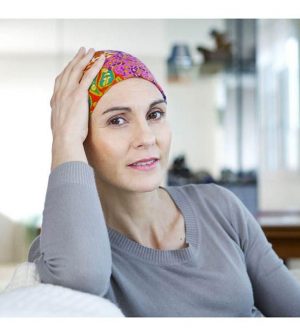- 10 Strategies to Overcome Insomnia
- Could Artificial Sweeteners Be Aging the Brain Faster?
- Techniques for Soothing Your Nervous System
- Does the Water in Your House Smell Funny? Here’s Why
- Can a Daily Dose of Apple Cider Vinegar Actually Aid Weight Loss?
- 6 Health Beverages That Can Actually Spike Your Blood Sugar
- Treatment Options for Social Anxiety Disorder
- Understanding the Connection Between Anxiety and Depression
- How Daily Prunes Can Influence Cholesterol and Inflammation
- When to Take B12 for Better Absorption and Energy
New Drug Combo Boosts Survival Against Aggressive Form of Breast Cancer

New research offers good news for women with an aggressive HER2-positive breast cancer.
A targeted therapy, trastuzumab deruxtecan (T-DXd), sold as Enhertu, triples the length of time that the cancer remains in check when compared with the current gold standard, trastuzumab emtansine (T-DM1).
Both of these drugs are second-line treatment options for HER2-positive breast cancer that has continued to spread after initial therapy.
“It really truly blew T-DM1 out of water in terms of progression-free survival,” said study co-author Dr. Sara Hurvitz, director of breast cancer clinical research at UCLA’s Jonsson Comprehensive Cancer Center.
Up to 20% of breast cancers are HER2-positive, meaning there’s too much of a protein called human epidermal growth factor receptor 2 on the cell’s surface, causing the cancer to act more aggressively, explained Hurvitz.
Currently, the first-line therapy for women with this type of breast cancer is HER2 antibody therapy with pertuzumab/trastuzumab plus chemotherapy. If the cancer progresses, the standard care is to switch to T-DM1 (sold as Kadcyla), which comprises trastuzumab and chemotherapy.
But the new study may change this paradigm, Hurvitz said.
Given intravenously, T-DXd attaches to the HER2 protein, blocking its growth, and delivers high concentrations of chemotherapy directly to cancer cells that overexpress HER2.
The new study was funded by T-DXd manufacturers Daiichi Sankyo Inc. and AstraZeneca.
In the study of 524 women with HER2-positive breast cancer, those who received T-DXd had a 72% improvement in their progression-free survival compared to their counterparts who were treated with T-DM1.
At one year, 76% of women taking T-DXd didn’t show any signs of disease progression. By contrast, only 34% of women taking T-DM1 did not see disease progression at one year.
“This drug really lengthens progression-free survival time or time before a patient needs to switch therapies because the one that they are on has stopped working and their disease gets worse,” Hurvitz said. “This is very good news for patients.”
In addition, tumors shrank in close to 80% of women taking T-DXd, compared to only 34% treated with T-DM1. Fully 16% of T-DXd-treated women showed no evidence of disease at one year, the study showed. The new drug seemed to work especially well in women whose breast cancer had spread to their brain, Hurvitz said.
The findings were presented this weekend at the annual meeting of the European Society for Medical Oncology. Research presented at meetings is typically considered preliminary until published in a peer-reviewed journal.
One of the main safety concerns with this drug is the risk of interstitial lung disease, a group of lung conditions that causes scarring of lung tissues, Hurvitz said. The risk was low in the new study, and the women who did develop interstitial lung disease tended to have mild cases, she said.
Outside experts are equally enthusiastic about the study findings and what they may mean for women with advanced HER2-positive breast cancer.
“T-DXd represents a new standard of care, used in place of TDM-1, in advanced HER2-overexpressing breast cancers,” said Dr. Charles Shapiro. He is a professor of medicine, hematology and medical oncology at Icahn School of Medicine at Mount Sinai and a medical breast oncologist at Mount Sinai Tisch Cancer Center in New York City. “The world is brighter for women with HER2 overexpressing breast cancers.”
“This study may lead to a change in the standard of care for patients with metastatic HER2-positive breast cancer,” said Dr. Jesus Anampa Mesias, a medical oncologist at Montefiore Einstein Cancer Center in New York City. “The results of this study are impressive and unprecedented [and] will definitely change how I care for women with metastatic HER2-positive breast cancer.”
More information
Learn more about HER2-positive breast cancer at the American Cancer Society.
SOURCES: Sara Hurvitz, MD, director, Breast Cancer Clinical Research Program, Jonsson Comprehensive Cancer Center, UCLA; Charles Shapiro, MD, professor, medicine, hematology, and medical oncology, Icahn School of Medicine, Mount Sinai, and medical breast oncologist, Mount Sinai Tisch Cancer Center, New York City; Jesus Anampa Mesias, MD, medical oncologist, Montefiore Einstein Cancer Center, New York City; European Society for Medical Oncology Congress, Sept. 16-21, 2021
Source: HealthDay
Copyright © 2026 HealthDay. All rights reserved.










